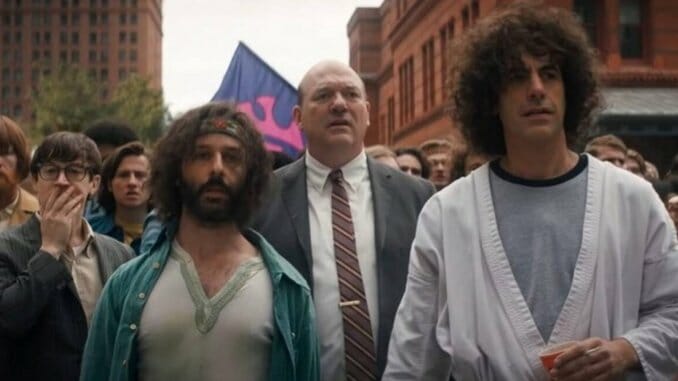Taking the Grandstand in The Trial of the Chicago 7

There’s a scene toward the end of Aaron Sorkin’s interpretation of the 1969 trial of the Chicago 7, aptly titled The Trial of the Chicago 7, where political activist, unapologetic spitfire and constitutional jester Abbie Hoffman (Sacha Baron Cohen) is called to give testimony over the events of the 1968 Democratic National Convention. To summarize: The occasion ended in riots, and Hoffman is one of several others—Tom Hayden (Eddie Redmayne), Rennie Davis (Alex Sharp), Jerry Rubin (Jeremy Strong), David Dellinger (John Carroll Lynch), and fall guys Lee Weiner (Noah Robbins) and John Froines (Daniel Flaherty)—accused of inciting the chaos. When asked whether he has contempt for his government, Abbie replies that “I think the institutions of our democracy are wonderful things that right now are populated by some terrible people.”
His words make up the perfect distillation of Sorkin’s aesthetic, being both a poetically written, powerfully spoken slice of dialogue as well as an eye-rolling fabrication. Hoffman never said anything of the sort, and he never would have because he was an anarchist, not an institutionalist. So when the character speaks in Baron Cohen’s remarkably well-affected Worcester accent, he’s speaking Sorkin’s language rather than Hoffman’s. The conflict between what happened and how authors interpret what happened is a factor in biopics of any sort. The Trial of the Chicago 7 is a reminder of that conflict and a lesson in how easily writers can muddy truth and upend suspension of disbelief by doing so: The Hoffman speech works, but on examination in concert with the record, its effect withers.
But the full-Sorkin grandstanding and speechifying at play in the film is so good and so clearly demonstrates his strengths as a writer and filmmaker that fuzzing up the truth doesn’t meaningfully stymie the viewing experience. In fact, The Trial of the Chicago 7 may be his sharpest, most well-made movie yet, an ensemble picture where the focus is on courtroom sparring matches, demonstration reenactments and a sprinkling of archival footage, as well as a predictable game of connect-the-dots between America 51 years ago and America today. There’s nothing wrong, of course, with saying the quiet part out loud in this case, given that the dialect and tactics and tyranny of the group representing the country’s right wing—government attorneys, cops, and judges—are so similar to the dialect and tactics and tyranny of the country’s contemporary right wing.
-

-

-

-

-

-

-

-

-

-

-

-

-

-

-

-

-

-

-

-

-

-

-

-

-

-

-

-

-

-

-

-

-

-

-

-

-

-

-

-








































